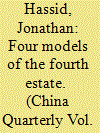|
|
|
Sort Order |
|
|
|
Items / Page
|
|
|
|
|
|
|
| Srl | Item |
| 1 |
ID:
114572


|
|
|
|
|
| Publication |
2011.
|
| Summary/Abstract |
Scholarly attention has not kept pace with the rapid changes in the professional role of Chinese journalists. Instead, two older views prevail. The first, which sees Chinese journalists as "mouthpieces" of the Communist Party unchanged from the Maoist era, downplays the tremendous changes in the media since 1978. The second view, holding that they are increasingly becoming "American-style professionals," overstates the influence of international media norms on Chinese news workers' day-to-day reality. While such communist and American-style professionals do exist in contemporary China, both are far less influential and numerous than stereotypes would suggest. Exclusive scholarly focus on these groups ignores two other more numerous and influential orientations: "advocate professionals," those who write to influence opinion and policy, and "workaday journalists," who work mainly for money and lack a commitment to public service. This article delineates all four types of Chinese journalist and explains why an understanding of the latter two professional orientations is critical to understanding China's media, politics and society.
|
|
|
|
|
|
|
|
|
|
|
|
|
|
|
|
| 2 |
ID:
132956


|
|
|
|
|
| Publication |
2014.
|
| Summary/Abstract |
The narrative about Chinese NGOs active in defending migrant workers' rights describes these organizations as increasingly powerful instruments through which Chinese people take part in public affairs, develop and articulate personal interests, and collectively form a more active and participatory citizenry. This article challenges not only the idea of labour NGOs as a progressive force for political change, but also the belief - widely shared among the international labour movement - that these organizations are sprouts of independent unionism in China. After a short overview of the historical process which led to the birth of labour NGOs in China, this article analyses the relations between these NGOs and four fundamental actors - the state, the workers, international donors and other NGOs - and argues that many of these organizations are struggling as a consequence of a substantial lack of "social capital."
|
|
|
|
|
|
|
|
|
|
|
|
|
|
|
|
| 3 |
ID:
131419


|
|
|
|
|
| Publication |
2014.
|
| Summary/Abstract |
The rise of think-tanks in the United States, in Europe and around the world has generated considerable scholarly attention in recent years. Much of this interest has been fuelled by the widespread belief that these institutions have come to play an increasingly influential role in shaping both public opinion and the domestic and foreign policy preferences and choices of high-level decision-makers. This perception was reinforced when several think-tanks with close ties to the administrations of President George W. Bush and Prime Minister Tony Blair advocated a far more muscular posture towards Iraq in the months and years following the events of 9/1ya. As think-tanks on both sides of the Atlantic continue their efforts to become more entrenched in the policy-making process, scholars are beginning to pay closer attention to how these institutions, established ostensibly to engage in policy research, have become even more adept at political advocacy. Not surprisingly, as think-tanks have devoted more resources to affecting policy change, speculation about how much or little influence they wield has become more intense. The purpose of this article is to explore the evolution and transformation of foreign affairs think-tanks in North America and Europe since the late nineteenth and early twentieth centuries and to highlight, by relying on specific foreign and defence policy issues, the extent to which a handful of think-tanks have been able to become important fixtures in the policy-making community.
|
|
|
|
|
|
|
|
|
|
|
|
|
|
|
|
| 4 |
ID:
098383


|
|
|
|
|
| Publication |
2010.
|
| Summary/Abstract |
In 1947, Japan became the first East Asian country to introduce democracy, and it was not until four decades later that South Korea completed the democratic transition. Today, surprisingly, South Korea stands out among the East Asian countries as the one that has the most vibrant and politically powerful civil society, whereas in Japan, the role of the nongovernmental organization (NGO) sector in political advocacy is greatly limited. Using historical institutionalism, this paper tries to explain why the NGOs in South Korea and Japan play vastly different roles in political advocacy. It concludes that the different social movement traditions have played important roles in the evolution of the civil societies in Japan and South Korea, and led to the different levels of institutionalization within the NGO sector.
|
|
|
|
|
|
|
|
|
|
|
|
|
|
|
|
|
|
|
|
|